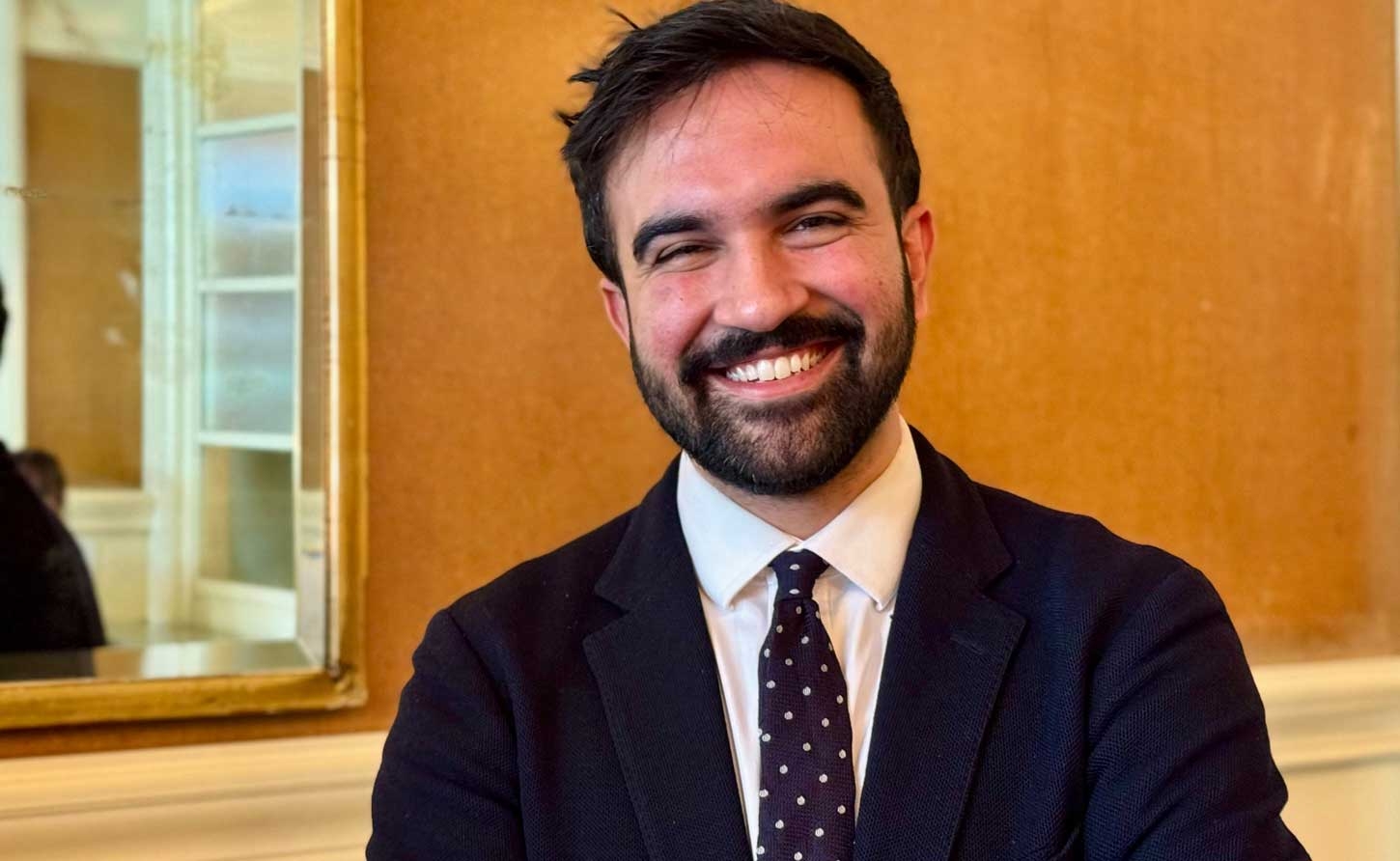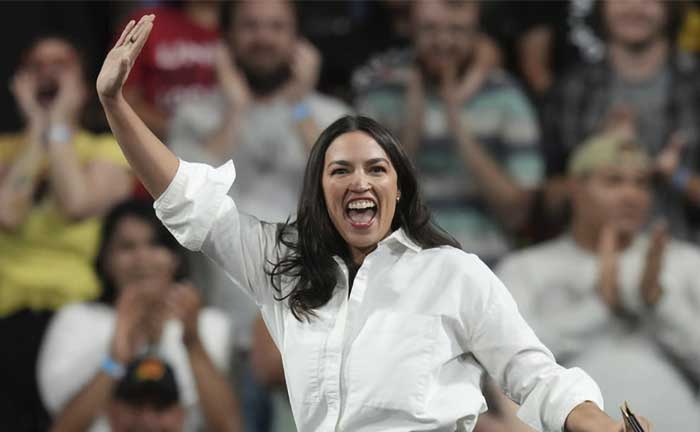UNITED STATES | Zohran Mamdani: From New York Assembly Backbencher to NYC Mayoral Frontrunner

MONTEGO BAY, Jamaica, June 16, 2025 - In the topsy-turvy world of New York City politics, nothing should surprise anymore. Yet even seasoned observers did a double-take at the latest polling numbers: Zohran Mamdani, a 33-year-old Democratic Socialist from Queens, has edged ahead of Andrew Cuomo in the race to become mayor of America's largest city.
The Public Policy Polling survey, conducted just after the first televised debate, showed Mamdani leading Cuomo 35 percent to 31 percent—a razor-thin margin within the poll's 4.1 percent error rate, but a seismic shift nonetheless. For months, the disgraced former governor had maintained comfortable leads despite the sexual harassment scandal that ended his gubernatorial tenure. Now, with just weeks until the June 24 primary, the race has crystallized into an unlikely showdown between the youngest and oldest candidates in the field.
The Digital Revolutionary With Real-World Results
Mamdani's rise isn't just about viral TikTok videos, though his social media prowess has certainly helped. The assemblyman has leveraged "slickly produced videos highlighting his platform" to cut through the noise in a crowded field, amassing over 278,000 followers and millions of likes. But beneath the digital savvy lies a record of concrete achievements that sets him apart from typical social media politicians.
His signature moment came in 2021, when he joined taxi drivers in a 15-day hunger strike to protest predatory medallion loans. The dramatic gesture paid off: the city eventually struck a deal securing more than $450 million in transformative debt relief for drivers drowning in debt. It was political theater that produced tangible results—and established Mamdani's brand as an uncompromising advocate willing to put his body on the line.
The African Connection - Kampala, Uganda
The Uganda-born assemblyman has also championed the city's first fare-free bus pilot and won over $100 million in the state budget for increased subway service. For someone Cuomo dismissively claims has been in government "27 minutes," Mamdani's legislative scorecard tells a different story.
The Coalition Builder
What makes Mamdani's surge particularly intriguing is his ability to build a genuinely multiracial coalition in a city where progressive politics often struggles beyond white, college-educated enclaves. The same poll showing him ahead of Cuomo revealed surprising demographic strength: while his support peaks among white and Asian voters, 27 percent of Black voters back him, as do nearly one-third of Hispanic voters.
This isn't accidental. Mamdani has systematically courted communities that typically don't factor prominently in Democratic primaries. His campaign literature has been translated into Urdu, Arabic, and Bangla, reflecting sophisticated outreach to the city's diverse linguistic landscape. South Asian voters particularly appreciate his advocacy for taxi medallion holders, while working-class Muslims outraged over Gaza have found in him a rare voice willing to challenge unconditional support for Israel.
"He can easily appeal to the typical highly educated yuppie socialists in North Brooklyn and western Queens," notes one political observer, "and they have formed an army of volunteer canvassers for him." But Mamdani's coalition extends far beyond the artisanal coffee shops of Williamsburg to the mosque parking lots of Queens and the taxi dispatcher offices of the outer boroughs.
The Money and the Machine
Nothing validates a campaign quite like cold, hard cash, and Mamdani has proven surprisingly adept at raising it. He's pulled in $8.3 million including matching funds, with $4.5 million still in the bank according to the latest Campaign Finance Board estimates. More impressive still, he reached the maximum funding limit for the primary—the first candidate to do so.
The endorsements have followed the money. Representative Alexandria Ocasio-Cortez gave him her coveted backing the day after the first debate, lending political star power to his insurgent campaign. The Working Families Party ranked him first on their slate, while fellow mayoral candidate Brad Lander officially cross-endorsed him in a move designed to consolidate progressive support.
The Policy Provocateur
Mamdani's platform reads like a progressive wish list: free buses, free child care, rent freezes for stabilized apartments, city-owned grocery stores, and a $30 minimum wage. He wants to create a "Department of Community Safety" to shift resources from policing to social services, and he's promising to build public supermarkets in each borough to drive down grocery costs.
Critics rightfully question the feasibility of these proposals. The Metropolitan Transportation Authority is a state agency, making his promise of free buses legally complex at best. His rent freeze would likely face court challenges, while universal child care would require massive new spending. When pressed on specifics, Mamdani often resorts to vague promises to "get creative with mayoral authority" rather than detailed implementation plans.
But his voters don't seem to mind the gap between aspiration and arithmetic. In a city where the median rent has soared past $3,000 and working families struggle with crushing living costs, Mamdani's boldness feels refreshing after years of technocratic incrementalism.

If Mamdani's progressive economics have broadened his appeal, his positions on Israel threaten to torpedo his candidacy in a city with the world's largest Jewish population outside of Israel. The assemblyman isn't just critical of Israeli policy—he's sponsored controversial state legislation to withhold public funds from organizations that operate in illegal West Bank settlements, a move critics denounce as antisemitic targeting of Jewish groups.
More inflammatory still, Mamdani has vowed to arrest Israeli Prime Minister Benjamin Netanyahu if he visits New York, citing an International Criminal Court warrant that has no legal force in the United States. When asked whether Israel has a right to exist as a Jewish state, he carefully sidesteps, offering only that Israel should be "a state with equal rights for all."
The semantic dancing hasn't fooled anyone. Video footage from 2021 shows Mamdani telling a crowd he is "anti-Zionist," a position that puts him sharply at odds with most Jewish Democrats. His support for the Boycott, Divestment, and Sanctions movement has drawn fierce criticism from Jewish community leaders who view BDS as fundamentally antisemitic.
Perhaps most damaging, Mamdani has declined to co-sponsor annual Assembly resolutions celebrating Israel's founding and Holocaust remembrance. While his campaign insists he voted for these measures, his reluctance to visibly support them sends a troubling signal to Jewish voters already skeptical of his candidacy.
The Cuomo Comeback
Mamdani's rise is inextricably linked to the political resurrection of Andrew Cuomo, whose candidacy has scrambled every expectation about the race. The former governor resigned in disgrace in 2021 amid sexual harassment allegations from roughly a dozen women, yet he leads in most polls, backed by major labor unions eager for a return to establishment politics.
For Mamdani, Cuomo represents both opportunity and existential threat. The former governor's polarizing presence has created space for an insurgent candidate to build a coalition of the disaffected. But Cuomo's institutional advantages—name recognition, union support, proven fundraising ability—make him formidable. More concerning for progressives, other polling shows Cuomo maintaining significant leads when ranked-choice voting is factored in, suggesting Mamdani's first-place showing may be an outlier.
The Experience Deficit
In an election that can only be won with unity, I am so proud to join forces with @MrMikeBlake in the fight for a city every New Yorker can afford. pic.twitter.com/OFmgcuQ59y
— Zohran Kwame Mamdani (@ZohranKMamdani) June 16, 2025
The most damning critique of Mamdani's candidacy isn't ideological but practical. As Cuomo noted during their debate confrontation, the assemblyman has "never negotiated with a union"—a significant deficit for someone seeking to lead a city with powerful municipal labor organizations. His legislative record, while progressive, remains thin: just three bills that became law out of 20 he sponsored since taking office in 2021.
More troubling is the persistent gap between Mamdani's soaring rhetoric and mundane governing realities. How exactly would a Mayor Mamdani implement free buses without state cooperation? Where would the billions needed for universal child care come from? His answers tend toward the aspirational rather than the actionable, a luxury unavailable to actual mayors facing actual budget constraints.
The Generational Gamble
As New York approaches its Democratic primary, Mamdani's candidacy poses fundamental questions about the future of progressive politics in America's most diverse city. Can a democratic socialist with controversial foreign policy positions win over moderate voters in a metropolis where pragmatism traditionally trumps ideology? Will young progressives turn out in sufficient numbers to offset skepticism from older, more centrist Democrats?
Mamdani himself acknowledges the challenge, noting that "a third of New Yorkers still haven't heard of us." But rather than seeing this as a liability, he frames it as opportunity—room to grow in the final stretch of a campaign that has already defied every conventional prediction.
The stakes extend far beyond New York. In a political moment when progressive Democrats nationwide are grappling with electoral setbacks and ideological reckonings, Mamdani's candidacy represents either the movement's resilience or its dangerous detachment from political reality.
The One Week Test
Whether Mamdani can sustain his momentum through the final sprint remains an open question. Cuomo's campaign has barely begun its negative advertising blitz, and the former governor's team clearly believes that sustained scrutiny of Mamdani's positions will drive wavering voters back to the establishment fold. The challenge for Mamdani will be maintaining his outsider appeal while appearing ready for the responsibilities of governing a city of 8.3 million people.
His journey from Kampala to Queens to the brink of power represents either the democratization of American politics or its dangerous radicalization, depending on your perspective. What's undeniable is that Zohran Mamdani has already changed the conversation in New York politics. Whether he can change the city itself will be decided by voters who must choose between revolutionary ambition and incremental pragmatism.
Next Tuesday, June 24, New Yorkers will render their verdict on whether they're ready for a mayor who promises transformation, even if that transformation comes with risks they may not be prepared to take.
-30-
